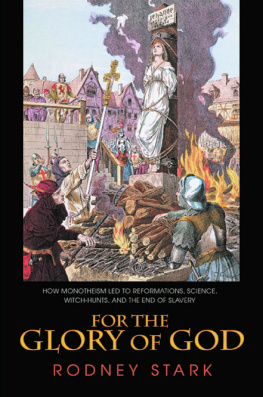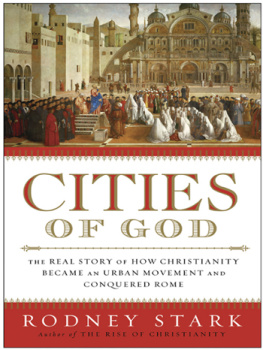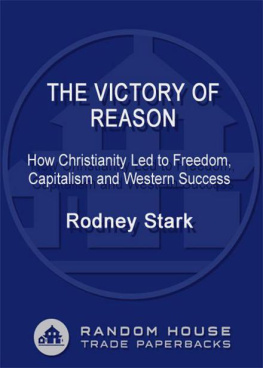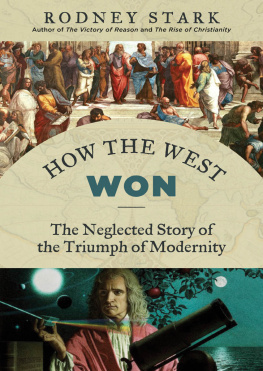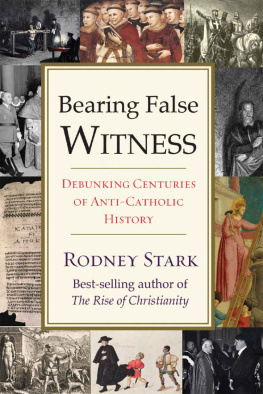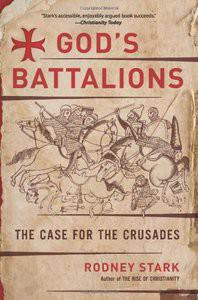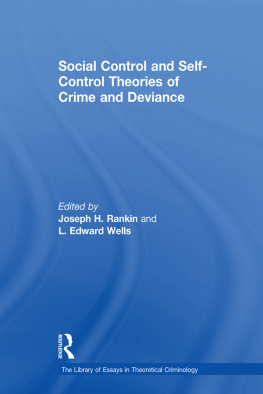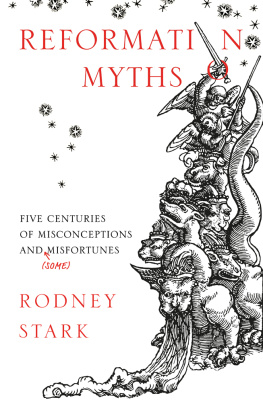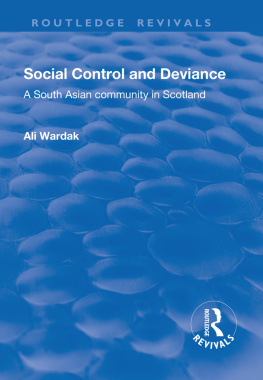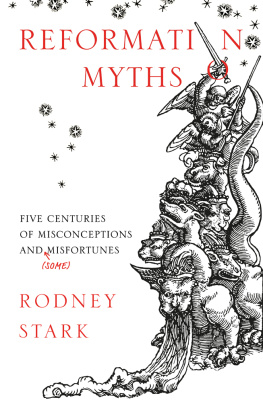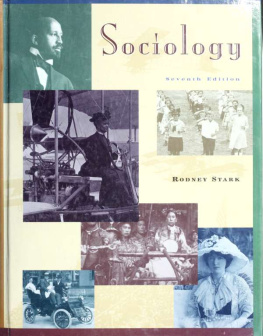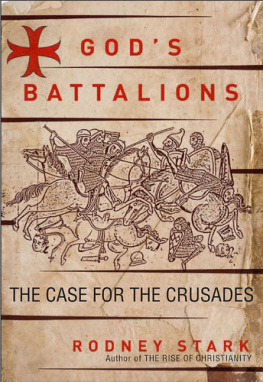First Published in 1996 by
Routledge
29 West 35th Street
New York, NY 10001
This edition published 2012 by Routledge:
Roudedge | Roudedge |
Taylor & Francis Group | Taylor & Francis Group |
711 Third Avenue | 2 Park Square, Mihon Park |
New York, NY 10017 | Abingdon, Oxon 0X14 4RN |
Copyright 1996 by Routledge, Inc.
All rights reserved. No part of this book may be reprinted or reproduced or utilized in nay form or by any electronic, mechanical or other means, now know or hereafter invented, including photocopying and recording, or in any information storage or retrieval system, without permission in writing from the publisher.
Library of Congress Cataloging-in-Publication Data
Stark, Rodney and Bainbridge, William Sims
Religion, Deviance, and Social Control / by Rodney Stark and William Sims Bainbridge.
p. cm.
Includes bibliographical references and index.
ISBN 0-415-91528-7. ISBN 0-415-91529-5 (pbk.)
1. ReligionsRelations. 2. Religious pluralism. 1. Title.
BL410.W54 1996
291.172dc20
95-42245
CIP
Religion and the Moral Order: An Introduction
As the social sciences emerged from philosophy at the end of the eighteenth century, their founders were unanimous in their assertion that religion reinforced the moral order. Despite this, many of these same founders eagerly awaited the collapse of religion, some because they were equally eager for an end to the prevailing moral order (down with false consciousness), and many others because they despised religion, regarding it as a bundle of irrational superstitions incompatible with enlightened thought. Indeed, in his The Positive Philosophy (183042), Auguste Comte proclaimed that a new science, to be called sociology, would replace religion as the basis for morality; this science would constitute a sort of ethical calculus.
Of course, nothing of the sort took place, and for most of the twentieth century social scientists have been content to teach that the primary social function of religion is to sustain the moral order. They have therefore assumed that the more religious members of any society will be less apt to violate the moral code (Parsons 1964a; Merton 1968).
Nevertheless, with the exception of studies of the linkage between denomination and suicide (which we will pursue in detail in correlates of crime and delinquency grew into a major enterprise, little serious attention was paid to religion. For example, a survey of 28 criminology textbooks found that only four included religion in their indexes (Stack and Kanavy 1983). Thus, it was to everyone's amazement when, in 1969, Travis Hirschi and Rodney Stark (reluctantly) struck a blow to social theory as well as to common sense by reporting their inability to find any correlations between measures of religiousness (Sunday school and church attendance as well as belief in Hellfire) and delinquency among high school students in Richmond, California. Soon, this finding was reconfirmed by Burkett and White (1974), who worked with data collected in Oregon.
Social scientists love nothing so much as irony, and Hirschi and Starks seemed the most ironic finding of them all: that kids were as likely to strip your car on the way home from Sunday school as they were on their way home from the pool hall or the video game arcade. Hence, the lack of a religious Hellfire effect on delinquency was enshrined in most introductory sociology textbooks.
Ironically, Hirschi and Starks finding applies only to the West Coast. As we will see in , studies done elsewhere in the nation unanimously discover strong negative correlations between religiousness and delinquency.
The Social a Nature of Religion
Our approach to the topic of religion and the moral order will not pursue a Hellfire effect. We do not locate religious effects primarily within the individual human psyche, but within the human group. That is, the propositions we will formulate and test stress that the way in which religion sustains the moral order is primarily social. Granted that persons having deep religious convictions about sin and divine judgment may strive to lead blameless lives. But, as we shall see, their capacity to do soindeed, their ability to form and sustain deep religious convictionswill depend greatly on the religiousness (or lack of it) of those around them.
Keep in mind, too, that although religion may generally function to support the moral order, clearly it does not always do so. Often enough, religious organizations and movements challenge the prevailing secular culture, and in so doing can be seen as a source of deviant behavior rather than as a source of social control. The role of churches in resisting and eventually overturning totalitarian regimes in Eastern Europe is a case in point. After the collapse of Soviet-bloc communism, the Roman Catholic Church in Poland or the Orthodox Catholic Church in Russia appear to be bastions of conventional morality. But under the old regimes they were considered sufficiently deviant to prompt serious repression and frequent official condemnation. It also needs to be recognized that many religious movements unsuccessfully challenge secular culture and the state. In doing so they become identified as cults and sects, and mere membership in such groups often qualifies as deviant behavior. We shall have much to say about such groups in the second part of the book.
As these examples illustrate, throughout the book our focus will be on religion as a social rather than as a psychological phenomenon. Thus, for example, we will be far less concerned about whether people holding strong religious beliefs are less apt to commit crimes than we will be to learn whether crime rates vary across communities according to differences in the degree and quality of community religiousness. Indeed, our emphasis will be on the morality of communities, not on individual morality. Consequently, although we will analyze individual-level data, our usual objects of study and comparison will be collective: cities, states, regions, nations, high schools, religious groups, and Utopian communes. Such units of analysis are often also referred to as ecological units, indicating that they surround individuals.
From time to time we will examine data based on individuals, but even then we will emphasize the effects of denominational membership and church attendancethe social aspects of faithrather than belief.
There is nothing new about stressing the social role of religion. The earliest social scientists did not limit themselves to the assertion that religion causes people to behave themselves (although they assumed that this was true), but that religion maintains the moral order of society. However, none of the early social theorists claimed that religion was the only basis for community morality. As an introduction to the book, it will prove useful to distinguish between social and moral sources of social integration.
Social Integration
The idea of social integration is central to all discussions of social deviance. How do societies hold together? How are people able to pat tern their behavior so as to resist temptations and opportunities to harm others to an extent sufficient to permit a relatively orderly social life? In his great work,




